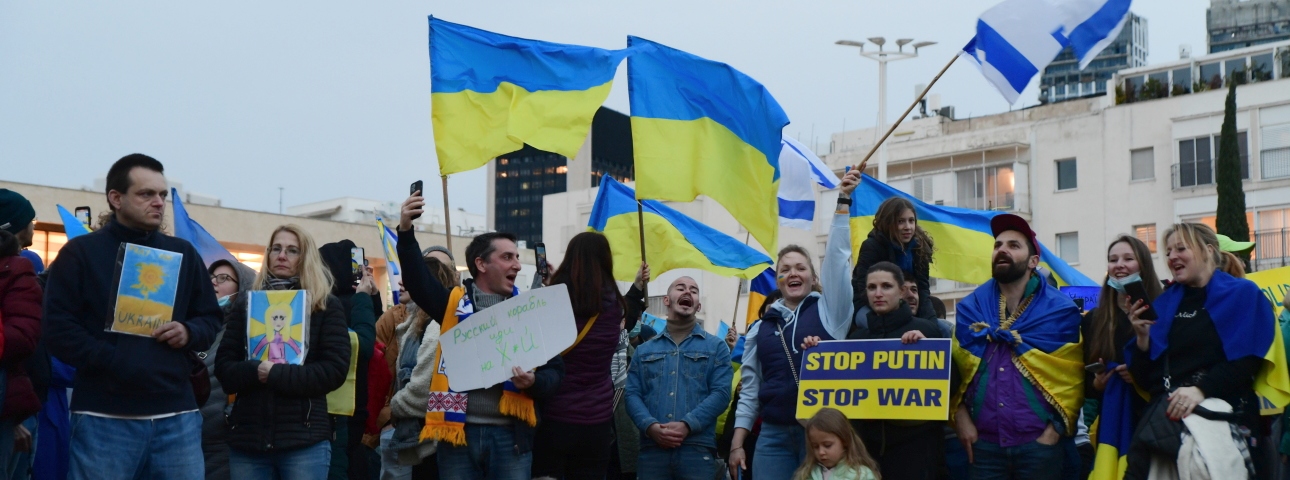60% of Israelis Back the Government’s Policy on the Russia-Ukraine Conflict - Special Survey
The Israel Democracy Institute's Viterbi Family Center for Public Opinion and Policy Research published a special survey on the stances of Israelis on Russia’s invasion of Ukraine and issues related to the conflict. The survey included both native-born Israelis and immigrants from the former Soviet Union – and found that 60% of Israelis back the government’s policy on the conflict and a large minority (44%) support absorbing refugees regardless of nationality

Flash 90
Main findings:
Who is responsible? 67% of Israelis think that Russia, led by Vladimir Putin, is mainly responsible for the conflict between Russia and Ukraine.
Cutting bureaucratic tape – 79% of Jewish Israelis think that Israel should drastically cut the bureaucracy for Jews who what to immigrate from Ukraine and 88.5% think the same should be done for Jews who want to immigrate from Russia (84%).
Among Arab Israelis, only a third think that the bureaucracy should be reduced for Ukrainian and Russian Jews.
Humanitarian aid – 76% of Jewish respondents think that Israel should prioritize humanitarian for Jews in the conflict zones. Among Arab Israelis, only 27% think so. Segmentation of the Jewish public by political camps shows agreement among the left a large minority (48%) think that Jews should be prioritized for aid, in the center - 72% and on the right - 83%.
Almost half (48%) of Israelis think the scale of the humanitarian aid being provided by the State of Israel to Ukraine is appropriate, 23% think it is too little, 12% think too large and 17% say that they don’t know.
Absorption of refugees and immigrants – 44% support the absorption of refugees regardless of nationality, Jews and non-Jews alike. There isn’t a substantial difference between immigrants from the Former Soviet Union and other Jewish Israelis.
There are major differences between the political camps among Jewish Israelis. On the left 74% support open immigration, 59.5% in the center and 31% on the right. Segmentation by the level of religiosity reveals that among the ultra-Orthodox only 6% support such an open border policy, among the National Religious - 20%, among the traditional-religious - 35%, among the non-religious-traditional - 35%, and among the secular - a majority of 60%.
Israel should absorb as many refugees as seek to enter, regardless of whether they are Jewish or not (%, Jewish population)
Opponents to the Russian regime - Given the severe actions being taken against opponents of the regime in Russia, 46% of the public thinks that Israel should make it easier for them to be approved for short-term entry visas to the country – 44% disagree.
Appropriate response – 60% of respondents think that Israel’s decision not to fully partake in the West’s sanctions against Russia is correct course of policy. 32% disagree. 44% think it would be better if Western countries intervened militarily rather than limiting themselves to economic and other sanctions on Russia, while 43% disagree.
In his speech, Ukrainian President Volodymyr Zelenskyy called for military aid from Israel, such as the Iron Dome, however only a minority (22%) would support the transfer of weapons and military equipment to Ukraine.
Self-reliant – 89% of Jewish Israelis agree that the events in Ukraine should teach Israel that it cannot rely on international bodies to maintain its security, and that the country can only rely on itself for defense.
Mediation efforts – 30% of Israelis think that there is a good chance that the mediation efforts by Prime Minister Naftali Bennett and Foreign Minister Yair Lapid will help end the fighting in Ukraine – 54% disagree and 16% don’t know.
Necessary resources –44% of Jewish Israelis and 46% of Arab Israelis think that the resources required to take in large numbers of Jewish immigrants from Ukraine will be provided at the expense of vulnerable populations already in Israel.
The Survey on the Conflict Between Russia and Ukraine was prepared by the Viterbi Center for Public Opinion and Policy Research of the Israel Democracy Institute. In the survey, which was conducted on the internet and by telephone (supplements of groups that are not sufficiently represented on the network) between March 14-17, 2022, 501 Jews men and women Immigrants from the CIS, 400 Jewish Non-Immigrants from the CIS and 103 Arabs, constituting a representative national sample of the entire adult population of Israel aged 18 and older. The maximum sampling error for the entire sample was 3.16%± at a confidence level of 95%. The fieldwork was done by the Midgam Institute. For the full data file see: Data Israel
